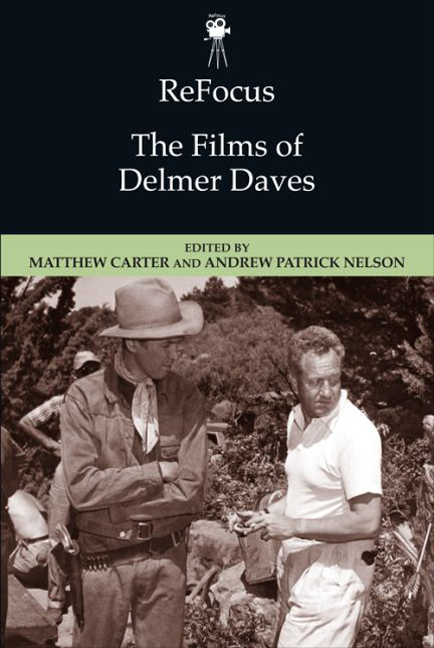Book contents
- Frontmatter
- Contents
- List of Figures
- Notes on Contributors
- Acknowledgments
- Introduction: “No One Would Know It Was Mine”: Delmer Daves, Modest Auteur
- 1 Don't Be Too Quick to Dismiss Them: Authorship and the Westerns of Delmer Daves
- 2 Trying to Ameliorate the System from Within: Delmer Daves’ Westerns from the 1950s
- 3 Bent, or Lifted Out by Its Roots: Daves' Broken Arrow and Drum Beat as Narratives of Conditional Sympathy
- 4 This Room is My Castle of Quiet: The Collaborations of Delmer Daves and Glenn Ford
- 5 Delmer Daves, Authenticity, and Auteur Elements: Celebrating the Ordinary in Cowboy
- 6 Home and the Range: Spencer's Mountain as Revisionist Family Melodrama
- 7 Delmer Daves’ 3:10 to Yuma: Aesthetics, Reception, and Cultural Significance
- 8 Changing Societies: The Red House, The Hanging Tree, Spencer's Mountain, and Post-war America
- 9 Partial Rehabilitation: Task Force and the Case of Billy Mitchell
- 10 “This Is Where He Brought Me: 10,000 Acres of Nothing!”: The Femme Fatale and other Film Noir Tropes in Delmer Daves’ Jubal
- Index
8 - Changing Societies: The Red House, The Hanging Tree, Spencer's Mountain, and Post-war America
Published online by Cambridge University Press: 15 September 2017
- Frontmatter
- Contents
- List of Figures
- Notes on Contributors
- Acknowledgments
- Introduction: “No One Would Know It Was Mine”: Delmer Daves, Modest Auteur
- 1 Don't Be Too Quick to Dismiss Them: Authorship and the Westerns of Delmer Daves
- 2 Trying to Ameliorate the System from Within: Delmer Daves’ Westerns from the 1950s
- 3 Bent, or Lifted Out by Its Roots: Daves' Broken Arrow and Drum Beat as Narratives of Conditional Sympathy
- 4 This Room is My Castle of Quiet: The Collaborations of Delmer Daves and Glenn Ford
- 5 Delmer Daves, Authenticity, and Auteur Elements: Celebrating the Ordinary in Cowboy
- 6 Home and the Range: Spencer's Mountain as Revisionist Family Melodrama
- 7 Delmer Daves’ 3:10 to Yuma: Aesthetics, Reception, and Cultural Significance
- 8 Changing Societies: The Red House, The Hanging Tree, Spencer's Mountain, and Post-war America
- 9 Partial Rehabilitation: Task Force and the Case of Billy Mitchell
- 10 “This Is Where He Brought Me: 10,000 Acres of Nothing!”: The Femme Fatale and other Film Noir Tropes in Delmer Daves’ Jubal
- Index
Summary
A dramatic clash of different cultures, broadly conceived, animates many of Delmer Daves’ films. In some cases, this clash takes the form of complex racial negotiations, as in Westerns like Broken Arrow (1950), Drum Beat (1954), and The Last Wagon (1956). In others, the clash is between nations, as in Never Let Me Go (1953) and Kings Go Forth (1958). Still others emphasize differences of class, as in A Summer Place (1959) and most of Daves’ subsequent melodramas. These conflicts seldom have clear winners and losers, and instead often end with some form of negotiation or reconciliation between the opposed forces. In this way, Daves’ films can be seen as dramatizing social progress: the passage from one social stage to another that supplants, in an act of improvement, the preceding one.
This chapter explores how Daves manages these complicated transformations as they take place within characters and their communities. I examine three films as representative of Daves’ concern with the rational, evolutionary passage from one social state to another. These are The Red House (1947), The Hanging Tree (1959), and Spencer's Mountain (1963). Drawn from three different decades, with each representing a different genre—mystery, the Western, and family melodrama, respectively—these films demonstrate that Daves’ interest in social progress was not a philosophy that the director explored only at one point in his career, or within one particular genre, but was a sustained, consistent authorial concern over the course of his lengthy filmmaking career.
Daves clearly believed in the possibility of social improvement rooted in the idea that, in a healthy community, every social stage will be, indeed, should be, better than the immediately preceding one. This outlook is an outgrowth of the belief, common in post-war American culture, that social transformation could be achieved through the rational application of the critical and ethical values of equality and justice to contemporary problems. The idea of a gradualist, ever-progressing, and increasingly better society, represented in Daves’ cinema, reflected the desire of moviegoers in America and elsewhere to become “better selves” in the post-war period.
THE RED HOUSE: THE ENTRANCE INTO SOCIABILITY
The popularization of psychoanalysis in the United States in the years leading up to and following the Second World War had a profound impact on American society and culture, especially in the ways in which parents understood their relationships with their children.
- Type
- Chapter
- Information
- ReFocus: The Films of Delmer Daves , pp. 166 - 183Publisher: Edinburgh University PressPrint publication year: 2016



